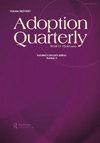Name Reclamation for Transracial Korean Adoptee Returnees in the United States and Europe
IF 0.6
Q3 SOCIAL WORK
引用次数: 1
Abstract
Abstract This qualitative study explored the experiences of transracial Korean adoptee returnees who were born in Korea, separated from their biological families, raised in the United States and three European countries by White families, and given an Anglicized or Germanic name at the time of their adoption. This study focused on participants’ journeys of reclaiming their Korean birth names and the various influences that factored into this decision. Data were collected from in-depth, semi-structured interviews (in-person or via Skype) and coded using grounded-theory methods that integrated a constructivist-interpretivist and critical epistemological paradigm . Participants (N = 12) were transracial Korean adoptees with ages ranging from 22 to 42 years (M = 32.67 years) who were between 0 and 88 months (M = 22.33 months) at the time of adoption, all of whom had returned to Korea. Results from the interviews revealed 11 axial categories and 2 overarching selective categories related to the name reclamation process: (a) name reclamation was part of a larger identity development process; (b) factors that prevented or slowed the name reclamation process. Limitations and future areas of research are discussed.在美国和欧洲被领养的跨种族韩国人回国者的名字回收
本定性研究探讨了在韩国出生、与亲生家庭分离、在美国和三个欧洲国家由白人家庭抚养,并在被收养时被赋予英语或日耳曼名字的朝鲜族被收养者的经历。这项研究的重点是参与者重新获得他们的韩国出生名字的过程,以及影响这一决定的各种因素。数据收集自深度、半结构化访谈(面对面或通过Skype),并使用整合了建构主义-解释主义和批判认识论范式的基础理论方法进行编码。参与者(N = 12)为跨种族被收养的韩国人,年龄22 ~ 42岁(M = 32.67岁),被收养时年龄在0 ~ 88个月(M = 22.33个月)之间,均已返回韩国。访谈结果揭示了与姓名回收过程相关的11个轴向类别和2个总体选择类别:(a)姓名回收是更大的身份发展过程的一部分;(b)妨碍或减缓名称回收程序的因素。讨论了局限性和未来的研究领域。
本文章由计算机程序翻译,如有差异,请以英文原文为准。
求助全文
约1分钟内获得全文
求助全文
来源期刊

Adoption Quarterly
SOCIAL WORK-
CiteScore
1.60
自引率
12.50%
发文量
3
期刊介绍:
Adoption Quarterly is an unparalleled forum for examining the issues of child care, of adoption as viewed from a lifespan perspective, and of the psychological and social meanings of the word "family." This international, multidisciplinary journal features conceptual and empirical work, commentaries, and book reviews from the fields of the social sciences, humanities, biological sciences, law, and social policy. In addition to examining ethical, biological, financial, social and psychological adoption issues, Adoption Quarterly addresses continuity in adoption issues that are important to both practitioners and researchers, such as: negotiation of birth and adoptive family contact.
 求助内容:
求助内容: 应助结果提醒方式:
应助结果提醒方式:


